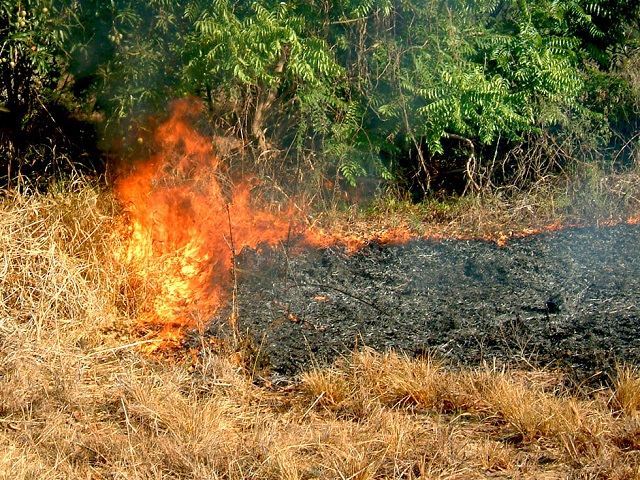
Kampala, Uganda | THE INDEPENDENT | Cultural leaders in Acholi sub region have warned the communities against the practices of setting fire on bushes and the surrounding forested areas within the region.
Their messages come in the wake of growing cases of bush fires across the region.
Bush burning, a practice “dictated” by tradition is common during dry season with sole intention to set pace for growth of new greener pastures when the first rainfalls and clearing land for agriculture. Others set the fire to hunt for wild animals.
But cultural leaders say the practice is leaving trails of negative impacts on the environment.
Paul Poppy Arop, the Pagen Clan Chief, in Kitgum district who also doubles as the chairperson of all cultural leaders in East Acholi says such the practices has partly led to the current change in the rainfall patterns being experienced.
He notes that in actual sense it’s prohibited for locals to burn bushes in their midst because it helps in conserving the environment.
Arop called on cultural leaders to engage their subjects in the grassroots in sensitization drive against habits of burning bushes.
Arop warned that the practise should be banned to save lives since past records have indicated death resulting from uncontrolled bush fires.
The Acholi Cultural Institution Premier Ambrose Olaa says bush burning traditionally was practised for a purpose unlike currently were individuals set fire on bushes with no positive reasons to back their actions.
He says the Acholi tradition respected burning of bushes adding that if need arose to burn bushes, it would be controlled with limited impacts on the environment.
“The current practice of bush burning is uncultured and as the cultural institution, we don’t condone the vice. Reckless Bush burning must stop because it has negative impacts” Olaa says.
Olaa says the practice, in the long run, will be disastrous citing its outcome is already being felt within and beyond the region calling for restrain from the community members.
Decimon Anywar, an environmentalist at Inter-generational Agenda on Climate Change [IACC] says rampant bush burning is responsible for release of black carbon into the atmosphere, which is the second-largest contributor to climate change.
He says the practice is also directly responsible for killing some of the bacteria helpful in the formation of soil that boost fertility of land for agriculture.
Anywar says the community members should adopt sustainable methods of burning bushes which don’t threaten the ecosystem and human lives.
Jerry Oyet, the project assistant community outreach programme at Refugee Law Project asserts that negative impacts of uncontrolled bush fire on arable land is becoming alarming in the region where majority of people practice agriculture.
The dangerous practice has since forced some of the local leaders especially in Kitgum district to draft up by-laws aimed at curbing anonymous setting of fire in bushes.
In Labongo Amida Sub County, the LCII chairperson Wilfred Nyeko reveals that a by-law was passed last year that bars any member of the community from burning bushes accompanied by fines on culprits.
For instance, any member in the sub-county who is caught setting fire pays 200,000 shillings and compensates respective families if the fire destroys their household properties.
******
URN
 The Independent Uganda: You get the Truth we Pay the Price
The Independent Uganda: You get the Truth we Pay the Price


